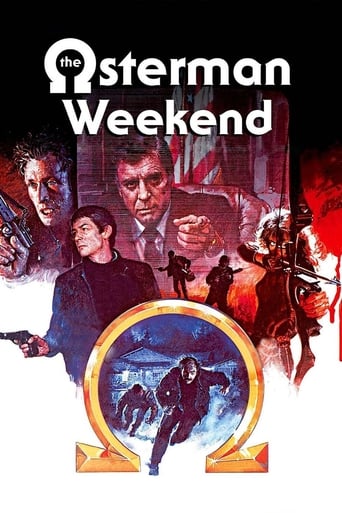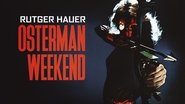Bill Slocum
It's Sam Peckinpah's last film, and as a fan of this brilliant, troubled man, I wanted it to be a good one to go out on. What I got instead is another of his problem pictures, an interesting premise and eye-raising performances done in by a loss of focus.John Tanner (Rutger Hauer) is a TV interviewer given an unpleasant assignment by CIA operative Lawrence Fassett (John Hurt): Confront a group of college friends with evidence they are working for a KGB operative named Mikalovich. An array of videotapes provided by Fassett demonstrates their culpability to Tanner. So he sets to work, his home the setting for a prearranged weekend gathering. If it works, a live interview with CIA Director Maxwell Danforth (Burt Lancaster) will be his reward.For Peckinpah, it was his first film in more than half-a-decade, and a chance to show he was still able to deliver a solid action film well after his gritty early-'70s peak. The CIA comes equipped with cool surveillance equipment and laser-sighted automatics. The Weekend itself, once it gets going, has a nice "Big Chill" vibe with paranoid undertones.So what goes wrong?It starts with a 40-minute intro that establishes the premise in clunky fashion. "I'm Cloak, you must be Dagger" Tanner says upon meeting Danforth, whom Lancaster plays with brio but not subtlety. "Being wrong is not nearly as important as not admitting it, not these days," he tells one Company weasel, and acts throughout as the kind of clod you wouldn't put in charge of a shoe store, let alone the CIA.Then we get to the Weekend itself, with Tanner's college friends taking center stage. Each has their quirks. Osterman (Craig T. Nelson) is a very cool TV producer who describes himself as "a nihilistic anarchist who lives on residuals". Nelson is great fun, though the rest of the group, including Dennis Hopper, gets lost in the mix. Only Helen Shaver's turn as a coked-out floozy stands out, as much for her gratuitous nude scenes as for her entertaining freak outs.Sappy lite-jazz music by Lalo Schifrin underscores a lack of suspense. Hauer's Dutch accent keeps creeping in like Nastassja Kinski's, and his fragile relationship with his bow-toting wife (Meg Foster) isn't developed any more than those with his once-merry, now-sullen Berkeley chums.The actual jigsaw puzzle we get here is indifferently assembled and seems at end a few pieces short. At one point Tanner hears Osterman on tape tell his friends "Let's go to our friend John Tanner's house and set him up". Tanner doesn't take this kindly, reasonably enough, yet what Osterman may have meant is never explained. A lot of threads are pulled out this way only to be left floating in the breeze.John Coquillon's cinematography does capture something the rest of the film flails at, a sense of mystery and foreboding. Hurt's tortured performance as Fassett is nicely underplayed, watching beady-eyed between sips of wine from a china cup as the gears shift into play. And Nelson does crack me up, as in one scene which finds him running for cover."It'd be nice if we had weapons!""We do!" he is told. "Bows!""Bows?" Osterman replies. "That's keen!"In the end, we get a wrap-up lecture about the pervading influence of television and how this all was, as one character puts it, "just another episode in this snuff soap opera we're all in." Peckinpah supposedly hated this script, only using it because he needed the film, but I think those sad words represent his actual mindset all-too-well. Distrait, somewhat lethargic, and depressing, "The Osterman Weekend" gives us lots of clues but no answers as to where Sam fell off.
BroadswordCallinDannyBoy
"The Osterman Weekend" emits the feeling of a last gasp. What was an author's second novel later took this form of a director's last film. Sam Peckinpah was a good choice for directing, with film's like "The Wild Bunch" and "Pat Garrett and Billy the Kid" under his belt, Peckinpah wouldn't hesitate to show the grim world of betrayal and manipulation that Robert Ludlum showed through virtually everyone of his books. With spy films like the James Bond franchise being the most popular, this was the lesser seem side of that coin - the side that is less escapist adventure storytelling for boys.However, the problems that Sam Peckinpah was going through at his last stages have noticeably affected the film. The intricate plot is there, but feels stitched together in parts, though that may very well be due the studio demanding re-editing work. The action is at times sloppy with very little of the mesmerizing details of Peckinpah's previous action sequences; a car crash even contains multiple repeats of the same angle and makes some disastrous continuity. The other action scenes are a notch or two better, but still far from what they could have been.But, at least the plot and its many deceptions keep you guessing, right to the last shot. --- 6/10BsCDb Classification: 13+ --- violence, sexual content
jaibo
Nobody should claim too much for Sam Peckinpah's final movie, yet it's an intriguing work which communicates - in the midst of a lot of confusion, grandstanding and fustian - a real sense of unease about Western pseudo-democracies and their broadcast media.Rutger Hauer plays a David Frost-type chat show host who has made a career out of grilling powerful government and military big-wigs. He finds himself caught in the middle of a CIA action against three of his former college friends, who are alleged to be traitors. CIA operative John Hurt installs state-of-the-art surveillance equipment in Hauer's home and when the three friends come over for one of their regular reunion weekends all hell breaks loose, with accusations, counter-accusations, set-ups and assassinations the order of play. Eventually it becomes clear that Hauer and his friends have been entrammelled in Hurt's plot to revenge himself on his boss, Burt Lancaster, who green-lighted the murder of Hurt's wife some time in the past.All of this makes The Osterman Weekend your usual le Carré-type spy story. Yet the film has wider ambitions, as the surveillance and final showdown on TV are straining to say something about the way in which the media mediates every act we perform. The final showdown between Hauer, Hurt and Lancaster is enacted on a seemingly live talk show, a kind of untra-violent version of Frost/Nixon, and in the end Hauer does a Howard Beale and challenges his audience to turn him off with their last remaining ounce of free will. In a way, the film is a companion piece to Cronenberg's contemporaneous Videodrome, but sadly The Osterman Weekend's critique of the media-age lacks that film's formal precision, and the final shift from formula spy pic to media apocalypse is unearned. Perhaps if the producers had allowed Peckinpah's original cut to be released, the film would be more consistent - those who've seen the VHS of the preview edition might enlighten us.As a Peckinpah film, The Osterman Weekend gives us another portrait of an individual forced to take action against the forces threatening his family, a la Straw Dogs. It shows a corporate/military establishment corrupt and murderous, a la Pat Garrett and Billy the Kid. It shows a group of friends torn apart when history and larger forces overtake them, a la The Wild Bunch. But it does so less convincingly than any of these previous films, and whilst its merits make it worth watching, it probably can't be thought of as anything but an intriguing coda to a remarkable career.
MisterWhiplash
The Osterman Weekend, a respectable, entertaining if not auspicious swan song of a great subversive director's career (then again neither was his death very auspicious), is from a Robert Ludlum novel. Being that it's from the 'Bourne' series writer, going in without much knowledge of how he exactly writes one can be sure of certain traits that the film adaptations will have. One of which, chiefly, are some twists, and then double-twists, and maybe one more twist for the road. It's fitting though since the story is pit in the arena of the CIA, KGB, shady dealing, backstabbing, revenge, and friendships and family on a slippery slope. For Peckinpah, it's more of a "job" than an actual artistic endeavor like an 'Alfredo Garcia.' And, in fact, his final cut was taken away and re-edited slightly by the producers.Whether or not it's a credit to Bloody Sam's talent and intuition that the film looks as good as it does with the producer's meddling is hard to figure. Certainly things need to be paid attention to closely for confusion not to run rampant, but for this kind of thriller it doesn't feel too compromised. This isn't to say this is any unique material for Peckinpah, with the story of a TV show host (Rutger Hauer) who is put under pressure by an operative (John Hurt) to turn in his old college friends (i.e. Craig T. Nelson, Dennis Hopper) who come every year to his house for a weekend of frivolity, and then everything going to pot as the tables are turned. In fact, to be blunt, most any director with a capability for the spy-thriller genre could handle the material with good enough gloves to make it watchable.But for Peckinpah, luckily, there are some points where he can put his trademark touches on the material (i.e. car chase, final attack scene by the pool-side), and he's also got a pretty good ensemble to work with (aside from the others mentioned, Burt Lancaster appears in a few scenes and is terrific as usual in all of them). It's not very heavy material, and there's even some dated 80's music- odd since it's dependable Lalo Schifrin at the chords- put in a couple of scenes to badly staged sex scenes. But overall it's still good work from the director, usually on his toes with the material despite the reports of his alcohol abuse on the set. We're sucked into this character John's dilemma, and see the subtleness of Hurt's performance as an indicator that something isn't quite right throughout until the surprise comes along.It's slick film-making, with some touches of taut suspense thrown in, and a fairly tasteless bit involving a dog's severed head! Just don't go in expecting full blown magnificence (or the rock-em-sock-em style of the Bourne movies).







